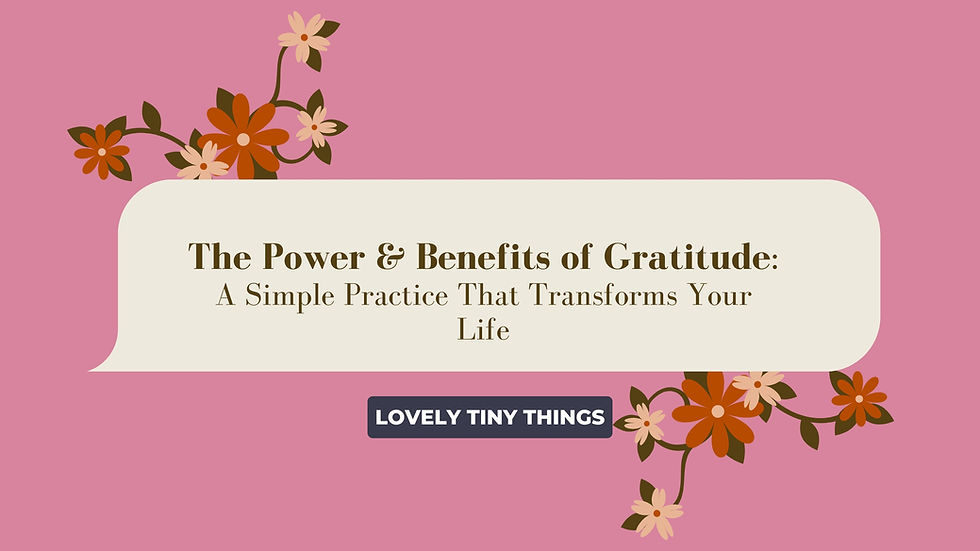The Power and Benefits of Gratitude: A Simple Practice That Transforms Your Life
- Aug 20, 2024
- 7 min read
Updated: Aug 21, 2025
Have you ever paused in the middle of a chaotic day and whispered a quiet “thank you”? Maybe for your child’s smile, a warm cup of chai, or a moment of peace between meetings. That tiny act—gratitude—isn’t just a feel-good emotion. It’s a powerful mindset shift that can reshape your life in ways science is only beginning to understand.
In this blog, we’ll explore the benefits of gratitude, how to practice it daily, and why it’s one of the most underrated tools for emotional wellness, stronger relationships, and personal growth.
Why Gratitude Matters More Than You Think
Gratitude isn’t about ignoring life’s challenges or pretending everything is perfect. It’s about choosing to focus on what’s working, what’s beautiful, and what’s meaningful—even when things feel messy. It’s a conscious decision to notice the good, even when the bad is loud. And that decision, repeated daily, can change the way we experience life.
Studies show that people who regularly practice gratitude experience higher levels of happiness, better sleep, stronger relationships, and lower stress. It’s not magic—it’s mindset. Gratitude helps us shift from scarcity to abundance, from frustration to appreciation. And in doing so, it opens the door to emotional clarity, resilience, and joy.
The Science Behind Gratitude
Neuroscience tells us that when we express gratitude, our brain releases dopamine and serotonin—the “feel-good” chemicals that boost mood and motivation. Over time, this rewiring helps us develop a more positive outlook, even in difficult circumstances. It’s like training your brain to see the silver linings more easily.
Gratitude also activates the prefrontal cortex, the part of the brain responsible for decision-making and emotional regulation. That means practicing gratitude can help us respond to life with more calm, clarity, and compassion. It’s not just a spiritual idea—it’s a scientifically backed strategy for mental wellness and emotional strength.
Simple Ways to Practice Gratitude Every Day

Gratitude doesn’t need grand gestures—it thrives in the quiet corners of our everyday lives. Whether you're a busy parent juggling school runs or a professional navigating deadlines, these simple practices can gently anchor you in appreciation. The beauty of gratitude is that it meets you where you are. It doesn’t ask for perfection, only presence. And the more you engage with it, the more naturally it flows into your thoughts, words, and actions.
From journaling a few lines each night to whispering a thank-you during your morning walk, these rituals are like emotional vitamins. They nourish your mindset, strengthen your resilience, and help you notice the magic in the mundane. A gratitude jar can turn into a family bonding ritual, while affirmations can rewire your self-talk. Even a short thank-you message to someone you admire can ripple outward in ways you’ll never fully see. These practices aren’t just exercises—they’re invitations to live more fully.
Real-Life Stories of Gratitude in Action
Gratitude becomes truly powerful when it’s lived—not just understood. I’ve seen it unfold in workshops, coaching sessions, and heartfelt conversations. One woman began writing gratitude letters to herself after a painful breakup, slowly rebuilding her self-worth with every word. Another father turned bedtime into a gratitude circle with his children, transforming stress into connection. These aren’t just anecdotes—they’re proof that gratitude can be a lifeline.
When we hear stories like these, we’re reminded that gratitude isn’t reserved for the lucky or the healed. It’s for anyone willing to look for light in the shadows. It’s for those who choose to honour what remains, even when much has been lost. These moments show us that gratitude isn’t just a mindset—it’s a muscle we build, a habit we nurture, and a gift we give ourselves and others. And the more we share these stories, the more we inspire others to begin their own.
How Gratitude Strengthens Relationships

Relationships flourish when appreciation is present. Whether it’s a partner, parent, friend, or colleague, expressing gratitude deepens trust and emotional intimacy. It tells the other person, “I see you. I value you.” In a world where criticism often comes louder than praise, gratitude becomes a balm—a way to soften misunderstandings and strengthen bonds. It’s not about being overly sentimental; it’s about being intentional with our words and attention.
When we thank someone for their effort, their kindness, or simply their presence, we create a culture of respect and empathy. Gratitude helps us shift from transactional interactions to meaningful connections. It encourages us to listen more deeply, respond more thoughtfully, and love more generously. And in families, workplaces, and friendships, that shift can be transformative. It’s not just about saying “thank you”—it’s about living it.
You may also like to read: Why Don’t Relationships Last Anymore?
Finding Gratitude in Tough Times

It’s easy to feel thankful when life is flowing smoothly—when goals are met, relationships feel strong, and moments of joy are plentiful. But when grief, stress, or uncertainty cloud our days, gratitude can feel like an impossible choice. And yet, this is when it becomes most powerful. Gratitude in hard times isn’t about denying pain or sugarcoating reality. It’s about finding a flicker of light in the darkness, however small, and choosing to hold on to it.
Psychologists call this benefit-finding—the ability to recognise something meaningful in difficult experiences.
Studies have shown that people who practice gratitude during adversity report stronger resilience, better coping skills, and even physical health improvements like lower blood pressure.
Gratitude doesn’t erase the struggle, but it reframes it, helping us move from “Why me?” to “What can I learn from this?”
For example, I once met a woman during a resilience workshop who was navigating the loss of her job. Instead of drowning completely in fear, she started a simple nightly practice: writing down one thing she still had—a supportive friend, her own health, a skill she could rely on. Over weeks, her outlook shifted. She described it as “learning to see the cracks where the light was getting in.” Eventually, she rebuilt her career with a sense of deeper purpose. Gratitude didn’t remove her hardship, but it gave her the strength to rise through it.
Even in grief, gratitude can soften the edges of sorrow. A young man who lost his mother shared how remembering small moments—like the day stories told over dinner or the smile that never failed to appear—helped him grieve with love rather than despair. In chaos, gratitude becomes a steady hand; in heartbreak, it becomes a quiet form of healing.
If you’re facing tough times, start small. Write down one thing you’re grateful for today, no matter how insignificant it may seem. Maybe it’s the sun breaking through the clouds, a kind word from a stranger, or simply the fact that you made it through another day. These tiny acknowledgements are not dismissals of pain—they are reminders that alongside the hard, something good still exists.
Gratitude in adversity is like planting seeds in rocky soil. It may take longer to grow, but when it does, it blooms with extraordinary strength. And every time you choose to notice even the smallest good, you are not only surviving—you are learning to thrive.
If this resonates with you, I’ve shared more about resilience and perspective in my blog on finding strength when life gives you lemons, where resilience and gratitude walk hand in hand.
Teaching Gratitude to Children

Children are naturally curious and open-hearted, which makes them perfect students of gratitude. When we teach them to appreciate what they have, we’re planting seeds of empathy, resilience, and emotional intelligence. Gratitude helps children develop a sense of abundance rather than entitlement. It teaches them to notice kindness, value effort, and express appreciation—skills that will serve them for life.
You don’t need formal lessons to teach gratitude. It can be woven into bedtime stories, dinner conversations, or playful games. Ask them what made them smile today, or encourage them to draw something they’re thankful for. These small moments build a foundation of emotional awareness and joy. And as they grow, they’ll carry this mindset into their friendships, challenges, and dreams. Gratitude isn’t just a lesson—it’s a legacy.
I’ve written a detailed guide on raising emotionally strong kids, which connects beautifully with the practice of gratitude.
Gratitude and Mental Health
Gratitude isn’t just a spiritual practice—it’s increasingly recognised in psychology and neuroscience as a powerful tool to improve mental health.
Research published by the American Psychological Association shows that people who actively practice gratitude report fewer symptoms of depression, lower anxiety levels, and a greater sense of overall well-being.
By shifting attention from what’s missing to what’s present, gratitude creates a subtle but steady rewiring of the brain, moving us toward balance and hope.
When we pause to appreciate—even something as small as the comfort of a cup of chai or the sound of birds at dawn—we trigger the release of serotonin and dopamine, our brain’s natural “happiness chemicals.” Over time, these small sparks build into a healthier emotional baseline. Gratitude doesn’t erase stress or sadness, but it softens their weight, making them easier to carry.
For people living with anxiety, gratitude can serve as an anchor. Instead of spiralling into worry about what might go wrong, daily gratitude practice redirects focus toward what is already right. For those struggling with depression, writing down three things they’re thankful for—even if it feels forced at first—can slowly create a shift in perspective. These tiny acts accumulate like drops of water, eventually filling the jar of resilience.
One of my workshop participants once shared how keeping a gratitude journal helped her manage burnout. Every night, she listed five small things she appreciated—a supportive colleague, a good meal, a smile from her child. At first, it felt silly and forced. But weeks later, she noticed she was less reactive, sleeping better, and even finding joy in her work again. Gratitude became her quiet therapy, a way to reclaim her sense of self.
If you’re looking to strengthen your mental well-being, start with just one practice: each morning, name one thing you’re grateful for. Write it down, say it aloud, or whisper it silently to yourself. This simple ritual creates a pause in the rush of life and reminds you that, even on hard days, not everything is broken. Gratitude doesn’t deny pain—it coexists with it, offering strength, perspective, and hope.
For more calming practices that complement gratitude, you may also like my blog on how to calm your mind in a busy world.
Final Thoughts: Gratitude Is a Way of Life
Gratitude isn’t a one-time exercise—it’s a way of seeing, living, and loving. It’s the quiet force that turns ordinary days into sacred ones. It’s the bridge between struggle and strength, between chaos and clarity. And it’s available to all of us, no matter our circumstances.
So today, pause. Breathe. Whisper a thank you. Not because everything is perfect—but because you’re choosing to see the beauty anyway.
Your Turn: What Are You Grateful For?
I’d love to hear from you. Share one thing you’re grateful for in the comments below—or tag Lovely Tiny Things on Instagram with your gratitude moment. Let’s build a ripple of thankfulness together.












Comments